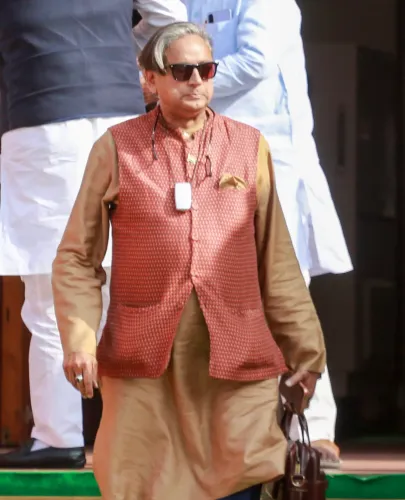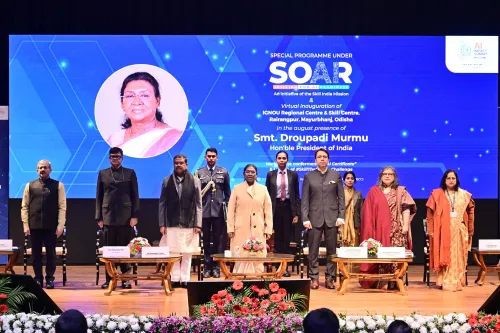The Third Eye: How Efficiency Paves the Way for Success in Personal and Professional Life

Synopsis
Key Takeaways
- Efficiency enhances quality of life.
- It does not require sacrificing personal time.
- Discipline leads to better time management.
- Emotional intelligence is vital for leaders.
- Work-life balance is key to personal fulfillment.
New Delhi: Embracing efficiency should not be viewed as a burden of 'compliance'—when seamlessly integrated into daily business routines, efficiency enhances life quality and unveils a new source of inner satisfaction or a unique happiness that is felt internally, rather than externally visible.
Being efficient is not a 'compulsion.' However, it's essential to recognize that it may serve as the 'perceived basis' for performance evaluations by 'outsiders' accustomed to certain prescribed metrics for assessment. Efficiency does not necessitate sacrificing personal leisure time.
It revolves more around cultivating an attitude and practice for one's moral or even spiritual well-being. Any 'material' benefits that arise should be considered a bonus.
Does 'efficiency' have a clear definition, and can it be aligned with a higher purpose in life for self-improvement? According to Hindu philosophy—as articulated in the Gita—'karma' or duty performed with 'devotion' is viewed as the highest expression of life's spiritual goal, particularly when executed without being weighed down by the anticipated material outcomes.
Any 'duty' is best fulfilled when performed efficiently, as only then does it yield optimal benefits for the recipient. Duty is an act of 'giving,' not 'taking,' requiring a commitment of energy and resources, with returns reflected in morality and 'good deeds,' measured by a profound sense of joy that can touch the heart and soul.
In a practical sense, 'efficiency' can be defined as the output per unit of resources used—money, materials, and manpower—with 'time' now recognized as a critical resource in a competitive global landscape. In today's economy, efficiency is evaluated based on how much an individual produces within a specific timeframe, which is why individuals are often compensated 'per hour' of work in developed economies.
Two factors influence a worker's output: their 'skill' development and the level of 'concentration' brought to the task. In successful organizations, orientation programs are vital in helping employees grasp the essence of their work while ensuring a stress-free environment, often compromised by organizational weaknesses.
In a well-functioning organization, there is clarity around credit-sharing, and work ethics define the relationships between bosses and subordinates, colleagues, and clients.
The CEO must comprehend human dynamics and sensitivities, acknowledging that 'business is fundamentally human activity.' They should excel at forming high-performing teams and recognize the value of diversity as a strength, establishing team leadership mandates.
A team leader should possess the right amount of emotional intelligence, enabling them to empathize with employees' concerns beyond the workplace, especially regarding family matters.
Inculcating an efficient working style should extend to personal lives as well. When engaged in a task, distractions should be absent—there is a time for work and a time for relaxation. Mixing the two should generally be avoided, regardless of the personal nature of the engagement.
A disciplined lifestyle embodies an efficient way of living as it facilitates better time utilization, balances mental and physical health, and boosts self-confidence. It allows individuals to recognize urgency or challenges that require a deliberate reallocation of time and resources, envisioning a timeline for returning to normalcy.
This fosters a greater sense of control during emergencies in personal life, which can affect anyone.
In business, navigating ups and downs allows leaders to ride out crises rather than succumb to them, understanding the necessary 'course corrections.'
Practitioners of a disciplined lifestyle can more readily identify the necessary reorganization of routines to manage disruptions. Life has a beginning and an inevitable end—keeping this awareness in mind logically leads to the conclusion that the best life is one where time is not squandered in 'emptiness.'
Efficiency, discipline, valuing time, purposefulness in life, and fulfilling pursuits are all intertwined with a successful life.
A sense of enrichment in both material and spiritual dimensions defines a life well-lived, and this satisfaction is a personal experience, not a mere imitation of others' lives. This uniqueness creates individual life stories that belong solely to each person.
‘Efficiency’ transforms life into an achievement, maximizing time utility, fulfilling 'duty,' and contributing to humanity's greater good. The concept of ‘Vasudhaiva Kutumbakam’ from Indian thought elevates lives by fostering contributions to the collective cause of humanity.
Valuing life as a unique experience diminishes the tendency to compete with others and blame them for unfulfilled desires.
A realistic assessment of one’s strengths and weaknesses, identifying areas of interest, and a willingness to exert effort form the foundation for success in any endeavor—without the fear of failure hindering progress.
Optimism, free from misconceptions, can be cultivated through adherence to a value system and a belief in the integrity of one's efforts.
Madame Curie, the Nobel Laureate, famously remarked after a lab 'mishap' that 'nothing in life is to be feared; it only needs to be understood.' A certain level of understanding about life as a finite journey helps maintain the sanity crucial for making sound decisions.
Life is a continuous process of decision-making, whether large or small, and it's important to recognize that well-informed decisions provide the best assurance of success.
In any scenario, one is either taking on a leadership role or executing someone else's decisions—this is true in both organizational and family settings. One should be an effective leader and a competent implementer.
Leadership necessitates decisiveness, initiative, and knowledge-based decision-making rather than reliance on misleading notions of 'charisma,' trustworthiness, and transparency.
A leader creates an environment within the organization that motivates every employee to excel in implementing the organization’s policies.
Toyota achieved market dominance by ensuring that assembly line workers diligently reported issues, setting a standard for those executing decisions.
In this scenario, the worker was attentive, fully engaged in the collective good of the organization, and able to provide valuable feedback.
The leadership of a prosperous organization manages its workforce in a way that allows relevant information about both internal and external conditions to flow freely. It adheres to the principle that 'nobody knows everything, but everybody knows something.'
Those executing orders form the majority of the organizational hierarchy, and they deliver their best when assured of fair credit distribution, believe in organizational ethics, and perceive a humane, nurturing, and principled response from leadership.
Achieving a balance between work and life is often crucial for determining an individual's quality of life—one should consciously strive for it by aligning it with one’s 'duty' across all fronts and fostering a sense of equity in fulfilling diverse obligations.
(The author is a former Director of the Intelligence Bureau)










